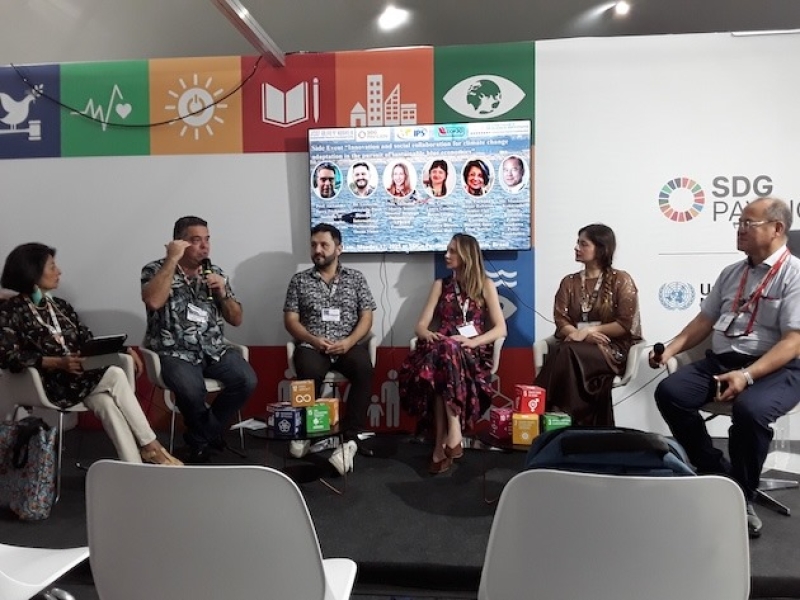- UNGA urges renewed int’l efforts for a resolution of Rohingya crisis |
- First National AI Readiness Assessment Report Published |
- China calls for implementation roadmap for new finance goal |
- New gas reserve found in old well at Sylhet Kailashtila field |
- Revenue earnings shortfall widens in October |
Ocean Innovation Seen as Key to Future Climate Solutions

Moderators Masanori Kobayashi (far right) and Farhana Haque Rahman, Senior Vice President and Executive Director, Inter Press Service (far left), at a COP30 side event titled ‘Innovation and social collaboration for climate change adaptation in the pursuit of sustainable blue economies.’
The oceans are a fundamental part of Earth’s climate system, regulating global temperatures by absorbing and storing vast amounts of solar heat, redistributing that heat through currents, and absorbing a significant share of human-caused carbon dioxide (CO₂). Yet scientific research into ocean systems remains severely underfunded.
Oceans absorb more than a quarter of human-generated CO₂ emissions and around 90 percent of excess heat. However, COP30 participants heard during a side event titled “Innovation and Social Collaboration for Climate Change Adaptation in the Pursuit of Sustainable Blue Economies” that only about 1.7 percent of global scientific investment is directed toward ocean science.
During the session, Meredith Morris, Senior Director of Strategic Philanthropy (Planet) at XPRIZE, highlighted the opportunities to tackle humanity’s toughest challenges through bold, scalable breakthroughs. She explained that XPRIZE invites the world’s brightest minds to transform ambitious ideas into lasting impact for people and the planet.
Owned by the XPRIZE Foundation, the nonprofit organisation designs and runs large-scale incentive competitions. It has supported projects in space exploration, carbon removal, global health and education by using prize-driven innovation models to accelerate breakthroughs.
“I lead the portfolio around energy, climate and nature. We set the bar for the change we want to see in the world, and we incentivise innovators to meet or exceed it. We do not honour existing work,” Morris said. “At XPRIZE, what we’re trying to do is catalyse systemic change. We believe philanthropy must create value, and that efforts to protect nature or address climate change should result in viable businesses and industries.”
Moderated by Masanori Kobayashi of the Sasakawa Peace Foundation and Farhana Haque Rahman, Senior Vice President and Executive Director of Inter Press Service, the event explored transformative scientific projects made possible at the intersection of research and funding.
Haque Rahman stressed the urgent need to communicate science in ways that resonate with communities on the climate frontlines. Kobayashi emphasised that amplifying blue-economy solutions is essential, as raising awareness can drive meaningful action.
The USD 100 million XPRIZE Carbon Removal competition incentivised scalable technologies to remove CO₂ from the atmosphere or oceans. Winning projects included enhanced rock weathering on farms and technologies that permanently store CO₂ in concrete.
Another initiative, the Shell Ocean Discovery XPRIZE, challenged teams to develop autonomous underwater technologies capable of rapid, high-resolution ocean-floor mapping. The winning innovations helped reduce the estimated time needed to map the entire ocean from centuries to just a decade.
Alexander Turra, Professor at the Oceanographic Institute of the University of São Paulo and head of the UNESCO Chair on Ocean Sustainability, spoke about Brazil’s Oceans Without Plastics initiative. Formally known as the National Strategy for a Plastic-Free Ocean, it is a comprehensive six-year plan (2025–2030) aimed at tackling marine pollution by targeting the entire plastic lifecycle—from production to disposal.
Brazil, with its long Atlantic coastline, is among the world’s top contributors to marine plastic pollution, affecting biodiversity, human health, fisheries and tourism. The initiative seeks to prevent, reduce and ultimately eliminate plastic waste entering marine and coastal environments.
Leonardo Valenzuela Perez, Director of International Partnerships at Ocean Visions, discussed the need for large-scale investment, resource mobilisation and scientific leadership to achieve carbon removal at scale. He underscored the essential role of science in designing effective solutions.
Laura Catalina Reyes Vargas, Founder and Executive Director of Ocean Hub, highlighted Colombia’s unique position as the only South American country with both Pacific and Caribbean coastlines. She noted that Afro-descendant and Indigenous coastal communities—among the poorest in the country—bear the brunt of climate and environmental injustice, linking the issue to the wider challenges addressed by the Sustainable Development Goals (SDGs).
She stressed that a successful blue economy must prioritise not only scientific research but also social equity, community participation and high-standard national planning.
The discussion also addressed regional organisational challenges.
COP30 has signalled a strong commitment to positioning oceans at the centre of global climate action. Earlier this week, during a high-level ministerial meeting, Brazil and France announced the creation of the Task Force on Oceans. The initiative aims to integrate oceans into a global mechanism that accelerates the adoption of marine solutions within national climate plans—encouraging countries to set ocean protection targets when updating their NDCs.

